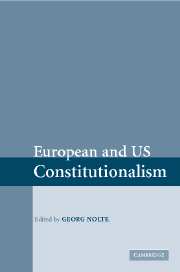10 - The two world orders
from PART VI - Democracy and international influences
Published online by Cambridge University Press: 13 August 2009
Summary
What is the source of America's growing unilateralism? The easy answer is self-interest: we act unilaterally to the extent that we see unilateralism as serving our interests. But the answer prompts a more searching question: Why do so many Americans view unilateralism this way, given the hostility it provokes, the costs it imposes, and the considerable risks it entails? Americans sometimes seem unilateralist almost by instinct, as if it were a matter of principle. Might it be?
It will not do to trace contemporary US unilateralism to the eighteenth-century doctrine of isolationism, for unilateralism is a very different phenomenon. An isolationist country withdraws from the world, even when others call on it to become involved; a unilateralist country feels free to project itself – its power, its economy, its culture – throughout the world, even when others call on it to stop. Although there may still be a thread of isolationism in the United States today, unilateralism, the far more dominant trend, cannot usefully be derived from it.
The search for an explanation should begin instead at the end of the Second World War. In 1945, when victory was at hand and his own death only days away, Franklin Roosevelt wrote that the world's task was to ensure ‘the end of the beginning of wars’. So Roosevelt called for a new system of international law and multilateral governance that would be designed to stop future wars before they began.
- Type
- Chapter
- Information
- European and US Constitutionalism , pp. 280 - 296Publisher: Cambridge University PressPrint publication year: 2005
- 3
- Cited by



